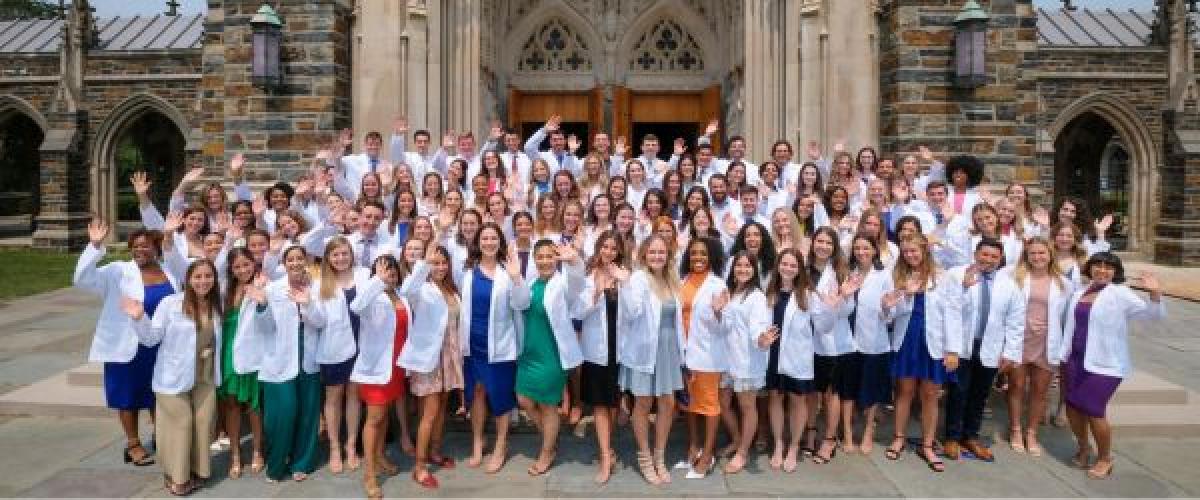
The DPT program is a two-year, ten-month, full-time program.
Yes, interviews are a required part of the admission process for the Duke DPT program. All interviews will be conducted virtually for the 2025–2026 application cycle.
No. Most coursework takes place during traditional school and business hours, between 8:00 a.m. - 5:00 p.m., with only a few classes scheduled in the evening.
Duke University is a private institution and does not have a residency requirement. Geographic location has no influence on acceptance, and tuition is the same for all students.
No. Applicants can major in anything as long as the required prerequisite courses are completed.
Successful applicants need a baccalaureate degree from an accredited college or university. Click here for more information.
The Duke DPT program does not have a minimum GPA requirement. However, applicants with a GPA of 3.4 and higher are most successful.
The mean grade point average of entering DPT students from the 2022-2023 admissions cycle was 3.7 on a 4.0 scale. We also separately calculate overall natural sciences grade point averages (basic biology, physics, and chemistry courses). The mean overall natural science GPA was 3.6 and the mean prerequisite GPA was 3.7.
Yes. If the applicant’s undergraduate institution accepted the AP credit then the Duke DPT program will also accept the AP credit. This credit must appear on the applicant’s official transcript.
No, we welcome all applicants who meet our requirements, and all applications are evaluated on an individual basis. The only limits are that the GRE must be taken within five years of application, and anatomy and physiology courses must have been completed within five years of application.
If a course is repeated both grades will be factored into the cumulative undergraduate GPA and overall science GPA. However, when calculating the prerequisite GPA the highest grade received will be used.
The only prerequisites that must be completed within five years of application are the anatomy and physiology courses.
Prospective students may apply before all prerequisite courses are completed. However, our Admissions Committee recommends that as many basic science courses be completed as possible at the time of application, especially anatomy and physiology. Prior to matriculation all official transcripts showing that all prerequisite courses have been completed and admissions requirements have been met must be received and verified before classes begin in August.
Maybe. The DPT Admissions Committee will consider course substitutions. The applicant must submit as much information about the course as possible (course description, syllabus, detailed outline of topics covered, etc.). This information can be emailed to the Duke DPT Admissions Office at dptadmis@dm.duke.edu. The Admissions Committee will review this information and make the final decision as to whether the course substitution is accepted.
As of March 2025, the GRE is no longer required by the Duke DPT program.
The Duke DPT program does not accept transfer credits from other physical therapy programs.
DPT Admissions Committee members encourage all qualified individuals who are interested in physical therapy to apply to the program. Each year, the Duke DPT program enrolls approximately 108 students.
During the past three years, approximately 30 percent of the incoming class has been male. The ratio varies from year to year.
Limited on-campus housing is available. Most Duke DPT students live in local apartment complexes within the Durham community. The Duke DPT Admissions Office sends out housing information to all accepted students to help with their transition to Durham.
At the time of application, 50 observation hours with a licensed physical therapist are required (paid and/or volunteer hours will be accepted). The Admissions Committee encourages applicants to observe in various clinical settings and specialties. All hours must be completed in person; virtual hours are not accepted.
The Interprofessional Education Care Center, supported by the Duke University School of Medicine and Duke School of Nursing, provides programs and pathways for engaging in interprofessional collaborative learning and practice.
The Duke DPT program offers a doctorate degree that includes all basic aspects of physical therapy. While the program does not offer specialties, there is an opportunity for emphasis in specialty areas through advanced practice courses, clinical affiliations, and research.
Students are required to complete a scholarly project as part of the evidence-based practice courses included in the program's curriculum. DPT faculty are involved in various research, and students are also able to apply to assist current faculty members on research projects that interest them.
Salaries for physical therapists vary according to factors such as geographical location, type of practice, and years of experience. Median salaries can be found via the APTA website.